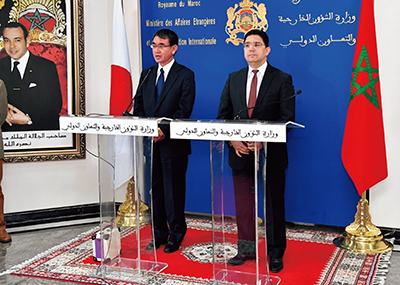Diplomatic Bluebook 2019
Chapter 2
Japan's Foreign Policy that Takes a Panoramic Perspective of the World Map
3 The Situation in the North Africa Region (Libya, Tunisia, Algeria, Morocco, and Mauritania)
The Maghreb is at the crossroads to Europe, Africa, and the Middle East, and has shared history, culture, and language in common. Recently, it has attracted attention because of this potential. On the other hand, as there is the issue of the return to the region from Iraq and Syria of foreign fighters, as well as the issues of refugees and illegal migrants entering Europe, etc., stabilization of the political system and security situation is a crucial issue.
In Libya, confrontation rooted in tribal society and the worsening of security since the collapse of the Gadhafi administration continues to be serious. Three parallel political forces continue to exist in the country─ one in the west (Tripoli) and one in the east (Tobruk), as well as a national unity government that was formed based on mediation from the UN and other parties. In May 2018, a four-party talk was realized under the leadership of France, between Prime Minister Sarraj of the Government of National Accord, Field Marshal Haftar of the Libyan National Army, Speaker of the House of Representatives Saleh, and head of the High State Council Mishri. Although the decision was made to hold an election in December, this was never brought to fruition. Furthermore, a summit-level international meeting was held in December under Italy's leadership, and the importance of convening a General National Congress at the start of the year, as announced by the Special Representative of the UN Secretary-General (SRSG) Salamé, was affirmed. There are plans to hold a citizens' referendum concerning the constitution in February 2019, and it is expected that the elections process will start. The security situation in Libya remains unstable. In August 2018, military conflict led by militia broke out in Tripoli, causing fatalities and injuries among civilians as well. It is hoped that, for the sake of stability within Libya and in neighboring countries, progress will be made with comprehensive political dialogue by Libyans, and that a legitimate national unity government can be established.
In December 2018, Foreign Minister Kono visited Morocco, Tunisia, and Algeria. These were the first visits by a Japanese Foreign Minister, in the context of bilateral relations in 31 years, 15 years, and eight years respectively. These three countries have maintained political stability after the “Arab Spring” and hold strong potential as a region for its geographical advantages and abundant young labor force. At the same time, however, they face economic and social risks such as disparity among regions and high unemployment rates. Foreign Minister Kono's visit promotes cooperation toward economic and social stability, as well as the enhancement of security and counter-terrorism measures, all of which are issues shared by the countries. At the same time, he affirmed efforts to develop frameworks for promoting business and to strengthen political dialogues, in order to further strengthen Japan's partnership with each country.
 Japan-Morocco Foreign Ministers' Meeting (December 24, Rabat, Morocco)
Japan-Morocco Foreign Ministers' Meeting (December 24, Rabat, Morocco)Although Mauritania shares a long border with the politically unstable Mali, the country is relatively stable compared to other countries in the Sahel Region and has experienced no terrorist attacks since 2012. In January 2017, Mauritania mediated in a peaceful change of government in Gambia and has contributed to regional stability. It also hosted the Assembly of the African Union (AU) in July 2018 in its capital, Nouakchott. Located in sub-Saharan Africa, Mauritania is also the westernmost Arabic country.
